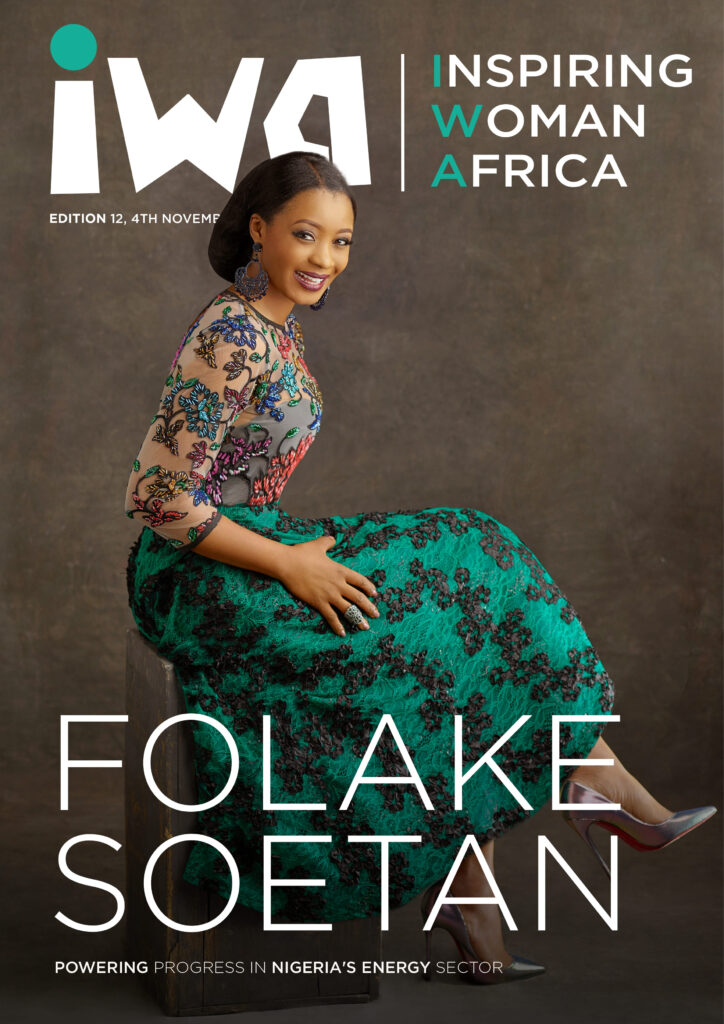
Folake Soetan is a visionary business leader with over two decades of exceptional impact across the Aviation, Oil & Gas, and Power sectors. With a solid foundation in Finance from the University of Lagos, complemented by the Advanced Management Program at Harvard Business School Executive Education, she combines deep commercial acumen with strategic foresight.
She began her career in Aviation, where she led revenue optimisation initiatives that significantly expanded market share. At Sahara Group, she played a pivotal role in building SO Aviation into a top-tier player across West Africa, elevating the business from 7th to 3rd position in the market within a short span.
In 2015, she joined Ikeja Electric, where her transformational leadership quickly propelled her from Deputy Chief Commercial Officer to Chief Executive Officer. Her tenure has been defined by innovation, resilience, and results.
One of her hallmark achievements includes pioneering the bilateral power initiative under the willing seller–willing buyer model with her team, delivering over 20 hours of power daily to residential clusters in Lagos State. This bold move laid the groundwork for the successful launch of Nigeria’s service-based tariff regime, a turning point in the country’s power sector.
Under her stewardship, Ikeja Electric has experienced unprecedented growth. She has led a landmark reduction in Aggregate Technical, Commercial, and Collection (ATC&C) loss by over 50%, while driving digital transformation and operational excellence. These efforts have earned the company industry recognition, including “Best Electricity Distribution Company” and “Most Gender Diverse Utility Company” at the 2022 Nigeria Power Sector Awards.
Folake also oversaw the company’s successful attainment of globally recognized certifications including ISO 9001:2015 (Quality Management System), ISO 14001:2015 (Environmental Management System), and ISO 45001:2018 (Occupational Health & Safety Management System) affirming her commitment to quality, safety, and customer satisfaction.
Beyond the boardroom, she is deeply committed to mentoring the next generation of leaders, particularly women and youth, through her active involvement in Women in Energy Network (WIEN) and Women in Management, Business, and Public Service (WIMBIZ). In 2022, she was named one of Eko 100 Women by Governor Babajide Sanwo-Olu for her advocacy for equity and inclusion.
A people-centric leader known for her bold decisions, integrity, and service-driven mindset, Folake is a catalyst for sustainable growth. Outside work, she enjoys redesigning living spaces, is a devoted wife and mother to twin boys, and an avid car enthusiast with a dream to one day race on a Formula One track.
What vision drives you as a leader, and how has this vision evolved throughout your career in such diverse sectors?
The vision that has always guided me is one of service through transformation. To take complex systems and help them work better, more reliably, and inclusively for people. Throughout my professional journey, whether in aviation, oil & gas, or now in the power sector, I’ve believed that leadership is not only about managing operations, but unleashing potential in people, technology, business models, and ultimately in communities. When I joined the workforce over two (2) decades ago, the vision was simple: to excel in whatever role I had, learn, and grow. Over time, as I moved across sectors and took on greater responsibilities, that vision matured. I began seeing the bigger ripple effects that a well-functioning power utility, for example, doesn’t just switch on lights, it changes lives, enables business, education, health. Now, as CEO of Ikeja Electric, my vision is crystalising around “customer first, technology now, sustainability always.” That means the customer experience matters as much as the kilowatt-hours; that technology isn’t optional but integral; and that we carry out our work with an eye to our environmental, social and governance legacy. In essence, the vision evolved from “doing things well” to “doing things well for others, and leaving something better than we found.” I feel that in diverse sectors you learn different lessons. In aviation, the urgency of service; in oil & gas, the discipline of risk and scale; in power distribution, the immense responsibility of public service. Combining them has sharpened my vision as a leader.

Specific challenges faced in your roles, particularly at Ikeja Electric, and how you turned it into an opportunity for growth?
Certainly. In my experience at Ikeja Electric, one of the most formidable challenges we faced was tackling the high level of ATC&C loss (that is, Aggregate Technical, Commercial and Collection loss) in the distribution network. At the time I stepped into greater operational responsibility, losses were still very high, customer trust was weak, and the infrastructure was under strain. It would have been easy to feel overwhelmed. But I chose to treat the challenge as a launching pad for change rather than a barrier. We assembled cross-functional teams from commercial, technical, customer service to probe the root causes — from energy theft to estimated billing, outdated meters, system inefficiencies. We then designed a programme of work: improved metering, network upgrades, customer engagement, stronger enforcement of commercial discipline. The moment we reframed “loss” as “potential recoverable” and “customer trust deficit” as “relationship opportunity”, the mindset shifted.
Over the next few years, the company made measurable progress. We reduced losses, improved supply reliability, and began rebuilding credibility with our customers and stakeholders. The lesson I learnt is that big problems often hold the biggest opportunity. When you face them head-on, with the right team, mindset, and resources, you can turn what seems like a liability into a competitive advantage.
For young leaders I’d say, don’t shy away from the messy, difficult, and the entrenched. Those are the places where meaningful transformation happens. Be relentless, stay human-centred, and keep your eyes on the long-term improvement, not just the quick fix.
Pioneering the bilateral power initiative under the willing seller–willing buyer model, and obstacles encountered
The inspiration came from a clear insight that some of our customers were suffering from the unpredictability of supply. They were bogged down in the old paradigm of “when the grid gives, we take” rather than us actively managing, optimising, collaborating, and innovating. The willing seller–willing buyer model (the bilateral power initiative) allowed us to explore a new boundary of engaging directly with power producers, optimising grid usage, and improving supply certainty in our franchise area.
We asked, “What if we could guarantee a baseline of hours of supply, rather than merely hope for it?” When we introduced that model at Ikeja Electric, it felt bold. We had to align internal operations, negotiate with players in the value chain, manage regulatory and commercial intricacies, ensure that the grid and distribution sides were fit for the model. Some of the obstacles were regulatory uncertainty, existing infrastructure constraints, coordination between multiple stakeholders who were used to the status quo, and the risk of customer expectations rising before we could fully deliver. We overcame these by building strong partnerships, creating clear commercial frameworks, and transparently communicating with customers. Yes, we were trying something new, may face setbacks, but we were committed. On the technical side, we invested in monitoring, improved network capacity, and ensured the premise was realistic before scaling. For the first time in Nigeria, customers under that initiative began receiving a minimum of about 20 hours of power supply through the national grid under the willing seller–willing buyer scheme.
The lesson I took away is, innovation doesn’t mean perfection out the gate. It means being willing to try, being transparent about the journey, and building the ecosystem around the change. When you deliver something measurable, you earn trust and set a new standard for what’s possible.
Strategies employed to achieve significant reduction in ATC&C losses at Ikeja Electric, and lessons learnt
There’s no single magic formula for reducing ATC&C loss. It’s a mix of strategy, culture, technology, and persistence. When we began this journey at Ikeja Electric, I knew we had to address the issue from all angles. So, we started by building data-driven transparency. We needed to see where and why the losses were occurring before we could meaningfully tackle them.
We introduced smart metering, improved the billing infrastructure, and deployed Geographic Information Systems (GIS) to map our network in real-time. Technology gave us visibility, but people made it work. We re-trained our field teams to prioritise customer engagement and community trust rather than just enforcement. We also invested in energy accounting, tracking every kilowatt-hour from source to socket, which helped us reduce both technical and commercial inefficiencies.
What I found most transformative, however, was the mindset shift. We stopped seeing losses as “inevitable” and began seeing them as “unrealised efficiency.” That change empowered teams to take ownership of results. As improvements rolled in from lower theft to higher collection rates, we celebrated small wins, which built momentum for bigger ones.
The lesson I carry from that experience is simple but powerful: people don’t resist change; they resist feeling powerless in the face of it. When you give people the tools, clarity, and purpose to succeed, they’ll surprise you with their ingenuity and commitment.
The role of digital transformation in the power sector and technologies or practices with the most potential for future growth
Digital transformation is no longer a “nice-to-have”; it’s the lifeblood of efficiency, transparency, and trust in the modern power sector. The power business is complex, involving generation, transmission, distribution, and millions of customer touch-points. To manage that effectively, you need real-time data, not just in reports, to guide every operational and customer decision.
At Ikeja Electric, we’ve embraced digital tools to simplify the customer’s journey, from online payments and e-billing to predictive fault reporting and digital mapping of our network. The result has been greater visibility, accountability, and speed in resolving customer issues. We’re also exploring how smart grids and IoT (Internet of Things) sensors can help us predict faults before they happen and reduce downtime.
The technology with the greatest potential, in my view, is data analytics combined with automation. When data becomes predictive instead of reactive, you move from firefighting to foresight. That’s where true transformation happens.
However, technology alone isn’t enough. You need a culture that embraces it. People who aren’t afraid to learn, fail fast, and innovate again. My approach has been to make digital transformation personal, show teams how it makes their work easier, not harder. That’s when digital change sticks and starts to scale.

As a mentor, particularly to young women, what advice do you offer those looking to advance in traditionally male-dominated industries?
In my experience, success in male-dominated industries starts with self-belief. The world may doubt you, but you can’t afford to join that chorus. I tell young women: don’t shrink yourself to fit into the room. Grow until the room adjusts to your presence.
When I started my career in the energy sector, there were very few women in leadership. I learnt to focus on competence, consistency, and courage, and received immense support from my Principals at Sahara Group. Be the person who shows up prepared, delivers results, and speaks with conviction. People may notice your gender at first, but soon they’ll respect your impact.
I also encourage women to build alliances, not isolation. Seek both male and female mentors and sponsors who challenge you to grow. Support other women coming behind you. When one woman climbs, she should leave the ladder in place for others.
Finally, understand that leadership isn’t about perfection; it involves authenticity. It’s okay to be human, admit when you don’t know something, and to keep learning. The future belongs to those who bring both competence and compassion to the table, and women have that blend in abundance.
Biggest challenges currently facing the Nigerian power sector, and how can leaders address these challenges effectively
The challenges in the Nigerian power sector are well known. They include infrastructure gaps, liquidity issues, regulatory uncertainties, energy theft, among others. But beyond the technical and financial problems, I believe the greatest challenge is trust between consumers, regulators, and operators.
To address that, leaders must begin by owning the narrative and communicating honestly. We need to say what’s possible, set realistic expectations, and then deliver on them consistently. The more transparent we are, the more confidence we build.
Another key challenge is aging infrastructure and the need for massive capital investment. This requires creative partnerships between the public and private sectors, and regulatory reforms that reward efficiency and innovation.
Finally, we must prioritise capacity building. A modern power sector needs skilled professionals like engineers, data analysts, customer specialists, and problem-solvers. We’re investing in training at Ikeja Electric because the future grid will be as much about people as it is about wires.
Leaders in this space must combine vision with empathy, seeing both the grid and the people connected to it. That’s how we move from challenges to opportunities.
Sustainability for the future of oil & gas and power sectors, and steps organisations must take to prioritise it
Sustainability is not a buzzword anymore; it’s a responsibility. The world is changing, and energy transition is not a far-off concept; it’s here. For companies in oil & gas and power, sustainability requires balancing today’s needs with tomorrow’s obligations.
At Ikeja Electric, we define sustainability across three pillars: environmental stewardship, social impact, and governance ethics (ESG). That means minimising losses, reducing our carbon footprint, digitising operations to save resources, and creating opportunities for women, men, and young professionals.
Organisations must start by making sustainability measurable. It’s not enough to make promises, you need data and accountability. When sustainability becomes part of performance metrics, it shifts from an ideal to a practice.
Personally, I believe sustainability begins with mindset. It’s about asking, every day, “How can we deliver energy more responsibly?” Whether that means encouraging energy efficiency, investing in renewables, or building community resilience, it’s all part of the same goal of ensuring our progress today doesn’t compromise tomorrow’s possibilities.
On being recognised as a leader in gender diversity, how does this impact your approach to company culture and recruitment?
Being recognised as a leader in gender diversity is both an honour and a responsibility. For me, it’s about creating an environment where everyone, regardless of gender, can thrive and contribute fully. I’ve always believed that diversity is both a moral imperative and a business advantage.
At Ikeja Electric, we’ve made deliberate efforts to recruit, retain, and promote competent women across functions, from engineering to finance, to operations. We’re intentional about providing equal access to opportunities, but also ensuring our culture supports women when they’re in those roles.
I make it a point to ensure our policies reflect inclusivity like flexible work arrangements, leadership development programmes, and mentorship initiatives for women. More importantly, I try to lead by example, showing that you can be both compassionate and decisive, ambitious and grounded.
When people see diversity represented at the top, it sends a powerful signal of “You belong here.” That message alone can change someone’s career and life.
Balancing your demanding career with family life, and practices you find most effective
In my experience, balance is more about presence than perfection. There are days when work takes more of my time, and other days when family takes precedence. The key is to be fully present wherever I am. When I’m at work, I give it my focus. When I’m at home, I give my family my attention and heart.
I’ve learnt to delegate and prioritise. You can’t do everything, and that’s okay. I have a wonderful support system both at home and at work, and that allows me to focus on what truly matters. I’m intentional about family time; we talk, laugh, share meals, and create memories. Those moments keep me grounded.
I also believe in self-care as a leadership tool. You can’t pour from an empty cup. So, I make time for rest, prayer, and reflection. Sometimes, balance simply means giving yourself grace, understanding that being both a leader and a mother is not about doing it all, but doing what’s meaningful and impactful.
My advice to working mothers: don’t chase balance as a fixed point; think of it as a rhythm that changes with each season of life. Embrace it with flexibility and gratitude.
Redesigning living spaces and its influence on your creativity and decision-making in business, how do you make time for it despite your busy schedule?
Design has always been my quiet escape. A way to express creativity outside spreadsheets and boardrooms. Redesigning living spaces reminds me that every structure, no matter how chaotic, can be transformed with vision, order, and beauty. That philosophy directly influences how I lead.
When I look at a challenging business problem, I approach it the same way I would a cluttered room: step back, visualise what’s possible, and then start rearranging piece by piece until everything flows. It’s both artistic and strategic.
Making time for it is intentional. I carve out moments during weekends, holidays, even short breaks to refresh a space or plan a new concept. It recharges my mind and helps me return to work with new ideas and energy.
I often tell people to find a creative outlet that has nothing to do with your job. It keeps your imagination alive and your perspective fresh. These are two things every leader needs.

What drives your passion for cars and Formula One? Can you share any lessons learnt from this interest that you apply to your professional life?
I’ve always loved cars; the engineering, precision, the speed, the teamwork that makes it all work. Formula One, in particular, fascinates me because it’s not only about driving fast; it’s about strategy, timing, and coordination. A brilliant driver can’t win without a cohesive team, and that resonates deeply with leadership.
The biggest lesson I draw from Formula One is the power of continuous improvement. After every race, teams analyse performance down to the smallest detail — what worked, what didn’t, how to shave off half a second. That’s how I approach business: never complacent, always learning, and iterating.
Another lesson is resilience under pressure. Races are unpredictable; one small error, and you must recover fast. Leading a company like Ikeja Electric is similar. You make quick decisions, adapt, and stay focused on the finish line despite turbulence.
Of course, Formula One teaches humility too. Even the best drivers have pit stops. Leaders also need moments to pause, recalibrate, and refuel.
Future aspirations for both yourself and Ikeja Electric, and how do you plan to achieve them?
For Ikeja Electric, my aspiration is to be a truly customer-centric, technology-driven, and sustainable utility that sets the benchmark for electricity distribution in Africa. I envision a company where every customer has reliable access to electricity, service excellence is the norm, and innovation drives progress.
To achieve that, we’ll continue investing in infrastructure, people, and technology. We’ll deepen partnerships across the energy value chain and build an agile, skilled, and passionate workforce ready for the future.
Personally, my aspiration is to keep evolving as a leader and mentor, help shape an energy industry that reflects inclusivity, accountability, and excellence. I want to inspire the next generation of women to lead boldly, take up opportunities, and redefine what’s possible.
Ultimately, my goal, for both myself and Ikeja Electric, is to be remembered for impact. That we didn’t just light up homes, but powered lives and possibilities.
Navigating your terrain as a female, what is your winning strategy?
Navigating a male-dominated field requires confidence, competence, and consistency. In my experience, people eventually stop seeing gender when results speak. So, my winning strategy has always been to be excellent, visible, and authentic.
I don’t approach leadership as a competition; I approach it as collaboration. I focus on building alliances, delivering value, and mentoring others. That’s how you earn respect, not by trying to prove your worth, but by demonstrating it consistently.
Another important strategy is emotional intelligence. You must know when to speak, when to listen, and how to influence without confrontation. Leadership is as much about empathy as it is about expertise.
Finally, I’ve learnt to embrace my uniqueness. Being a woman brings a different perspective; one that values inclusion, communication, and resilience. Those traits are strengths, not limitations.
How can power be readily available to Nigerians? What can be done to improve what we have now?
That’s a question at the heart of our mission. I understand the frustration; every Nigerian deserves consistent, reliable electricity. The solution lies in a combination of policy stability, infrastructure investment, and industry collaboration.
First, we need sustained investment in the entire value chain, from generation to transmission to distribution. No one segment can address the problem alone; it must be a coordinated effort. Second, we must embrace technology and data-driven management to reduce losses, detect faults early, and optimise supply.
At Ikeja Electric, we’re already implementing innovative models like the service-based tariffs and smart metering to improve reliability and customer satisfaction. But there’s still work to do, especially in regulatory reform and consumer education.
Ultimately, the power sector will transform when every player (government, operators, and customers) understands electricity is a shared responsibility, not just a service. We all have a role in building the system we desire.
To top female executives going through challenges they cannot share and have to show up regardless, what advice do you have for them?
I know that space, the quiet weight of responsibility, the strength required to smile through the storm. My advice is to remember you are human before you’re a leader.
It’s okay to feel tired, uncertain, or vulnerable. Strength doesn’t mean suppressing emotion; it means acknowledging it and still choosing to rise. Find a safe circle like mentors, friends, or family, where you can be yourself, unfiltered. You don’t have to carry everything alone.
Also, protect your peace. The higher you climb, the more intentional you must be about rest, reflection, and faith. I find renewal in prayer, solitude, and gratitude, as they remind me why I started and who sustains me.
Finally, know that every challenge refines you. Diamonds are made under pressure. Keep showing up not just for others, but for yourself.
What is the greatest lesson life has taught you?
The greatest lesson life has taught me is that purpose is greater than position. Titles come and go, but the impact you leave behind endures. Every role I’ve held has been a platform to serve, learn, and uplift others.
Life has also taught me humility; that no one achieves success alone. Behind every milestone are people, sacrifices, and grace. Recognising that keeps me grounded and grateful.
Lastly, life has taught me that challenges are disguised opportunities. Every setback I’ve faced has pushed me towards growth, resilience, and a deeper understanding of leadership. Therefore, I’ve learnt to thank life not only for the triumphs but for the trials because they shape the leader and the woman I am today.
Concluding words
If there’s one message I’d leave with readers, it’s this: your journey matters, every stage of it. Whether you’re climbing, pausing, or reinventing yourself, keep faith in your purpose.
To women (and men) alike, leadership isn’t a title; it’s a mindset. It’s taking responsibility, lifting others, and daring to dream beyond limitations.
As I often remind my team, transformation doesn’t start with resources; it starts with resolve. Believe in what’s possible, do the work, and stay rooted in integrity. The light we seek in our homes, lives, and nation begins with the one we carry within.